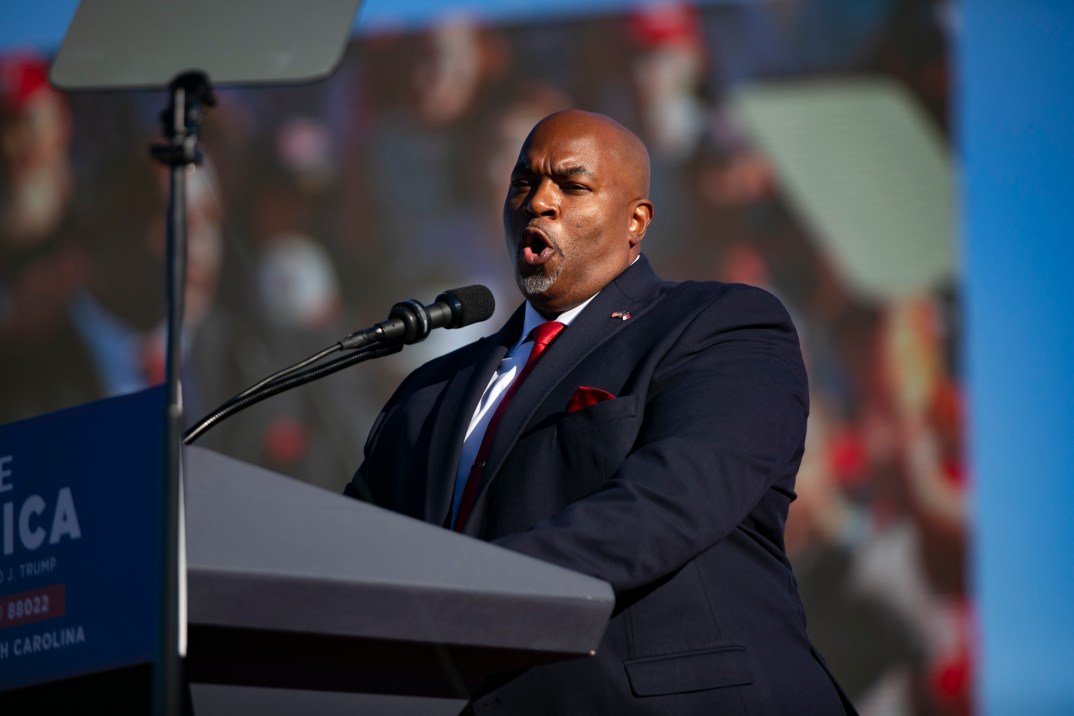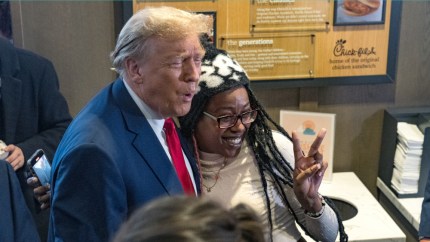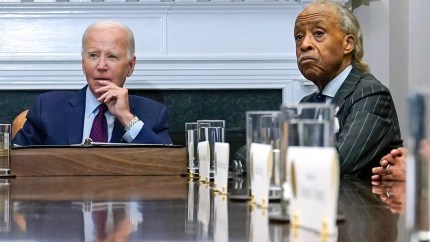Mark Robinson’s incendiary comments could jeopardize Black economy in North Carolina
“Mark Robinson’s hateful rhetoric – including his comments toward the Black community – jeopardizes companies’ desire to be in our state and, consequently, our state’s economy,” Josh Stein, Robinson's gubernatorial opponent, told theGrio.

Controversial North Carolina Republican gubernatorial candidate Mark Robinson, who continues to grab headlines for his comments on race, women, and the LGBTQ+ community, could potentially cost economic growth in the state, particularly for Black residents.
After Democrats in Connecticut indicated that they are eyeing businesses to attract away from North Carolina since Robinson’s primary election win made him the GOP nominee for governor, there is some concern about his rhetoric’s impact on the state’s economy and, more specifically, the state’s Black economy.
The “inflammatory and divisive comments” of Robinson, the state’s current lieutenant governor, could be “alarming” to businesses in North Carolina, argued Connecticut Democratic state senators in a letter to their state’s Department of Economic and Community Development. As a result, the lawmakers said they believe there is a “unique opportunity” to lure businesses to Connecticut.
As theGrio previously reported, Robinson, 55, has made controversial comments about race, like arguing that Black American descendants of enslaved people should pay reparations and that Black gang members and Planned Parenthood did more than the Ku Klux Klan to “eradicate the Black race.” He’s also mused about returning to an America “where women couldn’t vote” and has referred to lesbian, gay, bisexual, trans and queer people as “filth.”
“Mark Robinson’s hateful rhetoric – including his comments toward the Black community – jeopardizes companies’ desire to be in our state and, consequently, our state’s economy,” said North Carolina Attorney General Josh Stein, Robinson’s Democratic opponent in the governor’s race, in a statement to theGrio. “Businesses want to set up shop in places where their employees will be supported no matter who they are or where they come from.”
Stein added, “Instead of waging job-killing culture wars like Mark Robinson, I would further a North Carolina that welcomes and taps the potential of every person.”

Da’Quan Love, executive director of the NAACP North Carolina State Conference, told theGrio that businesses leaving the state would not only negatively impact North Carolina’s economy but would have adverse effects on Black residents.
“When white businesses and the white economic interests catch a cold, Black folks get pneumonia,” he explained. “We cannot afford to have divisive rhetoric like Mark Robinson’s … and the actions he’s taken as lieutenant governor to jeopardize economic opportunities for Black North Carolinians.”
Though the racial wealth gap between Black and white North Carolinians remains wide, the unemployment rate for Black residents has steadily decreased over the years. Love said Black entrepreneurship in North Carolina is growing, which is significant in a state ranked the best in the nation for business for two consecutive years by CNBC.
“We’re thankful to some of the leadership of Governor Roy Cooper and his administration for working with the NAACP to boost Black entrepreneurship,” said Love, who also noted that more Black North Carolinians are obtaining college degrees.
Having businesses turn away from North Carolina over the potential new governor’s rhetoric or policies would devastate the state and undo the progress already achieved. It wouldn’t be the first time the state encountered controversy that subsequently impacted its economy.
Under the last GOP governor, Pat McCrory, Republicans passed an anti-trans bathroom bill that resulted in boycotts from businesses and performers that cost the state more than $600 million, according to Forbes estimates.
“The NAACP recalls the economic repercussions that we faced following the passage of HB2,” said Love. “That’s not just for big corporations; it’s to small businesses and, ultimately, is to jobs for Black people.”
He continued, “We can’t afford to repeat history by electing leaders whose rhetoric alienates communities and jeopardizes economic opportunities for Black North Carolinians.”
Many small businesses in North Carolina have been thriving, including Black-owned businesses like The Flavor Hills restaurant and bar, which has two locations: in Raleigh, the state capital, and Jacksonville.
Owners Andre Truss and Eric Johnson II, who opened their first location in 2021 after the pandemic, told theGrio that while the economy remains “pretty tight,” they have seen success by creating an “experience” for patrons looking to dine and commune.
Recommended Stories
“It’s also affordable in a way that allows the general populace to be able to participate,” said Truss.
Johnson said the business also focuses on job creation and employee development, telling theGrio, “We put a lot of focus on building our staff up so that they can go out into the world and really be able to be successful.”
The entrepreneurs said any businesses leaving the state would cause harm to the greater North Carolina economy, including smaller operations like theirs.
“Businesses leaving the state is not going to be beneficial for anyone, especially coming out of COVID and trying to rebuild the economy,” said Truss. “We’re taking this as an opportunity to show that Raleigh is a place to be and North Carolina is on the rise.”
He added, “We’ve staked our personal livelihoods on starting with North Carolina and showing that this state is continuing to grow and continuing to give opportunities, especially to minority entrepreneurs, veteran entrepreneurs [and] women-led businesses.”
Politically, North Carolina is a crucial battleground state for the 2024 presidential election. Robinson, who was endorsed by presumptive Republican presidential nominee Donald Trump, is seen as a liability for Republicans in the state this November. As Democratic strategist Joel Payne told theGrio last week, Robinson is “so alienating and ostracizing to such a large swath of people” that he could “impact the top of the ticket.”
In 2020, Trump won the state by slightly more than 1%. Democrats, who see North Carolina as winnable for President Joe Biden, hope to seize on the momentum from the last presidential election.
On Tuesday, Biden joined Vice President Kamala Harris for a campaign stop in North Carolina to highlight the work of their administration over the last three years, particularly in making health care more affordable in the state.

Truss and Johnson said they welcomed the visit from the president and vice president and said it’s “shining a light” on the city of Raleigh and the state more broadly. Admittedly, said Truss, “If there was a way to get them in Flavor Hills, [we] would love to have that.”
Love, of the NAACP North Carolina State Conference, hailed actions taken by the Biden-Harris administration, like strengthening the earned income tax credit for working-class Americans, and said funding and grants from Biden’s American Rescue Plan, have been flowing into “communities all across the state,” including rural, suburban, and urban areas.
“It has helped to improve the lives of Black North Carolinians,” he told theGrio. He added, “We are excited about the progress that has been made, but we’re looking forward to 2025 and looking for our state’s leaders here in North Carolina, those that are running for our highest offices, to be engaged in this work and to present viable policy solutions that will have a positive impact” on Black residents in the state.
Referring to Robinson, Love said, “North Carolina’s leaders have to focus on implementing policies that support economic growth and equity rather than engaging in divisive rhetoric that undermines our state’s prosperity.”
The NAACP, he said, is focused on educating Black voters in North Carolina about the candidates, as polling shows a significant percentage of voters in the state do not know who Robinson or Stein is. More importantly, the organization is encouraging Black voters to show up to the polls on Nov. 5.
Love said the NAACP, which is nonpartisan, wants to see “economic plans” from both Robinson and Stein, telling theGrio, “We haven’t seen that from either campaign.”
“We challenge both campaigns to put out economic policy statements on specifically how they’re going to impact and support Black North Carolinians,” he said.

Gerren Keith Gaynor is a White House Correspondent and the Managing Editor of Politics at theGrio. He is based in Washington, D.C.
Never miss a beat: Get our daily stories straight to your inbox with theGrio’s newsletter.








